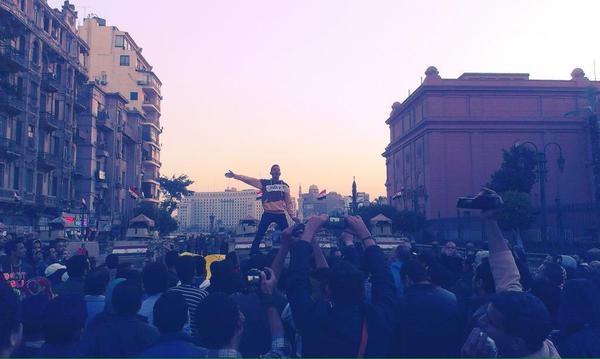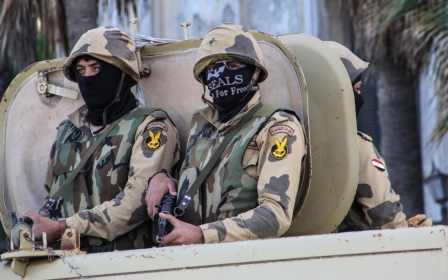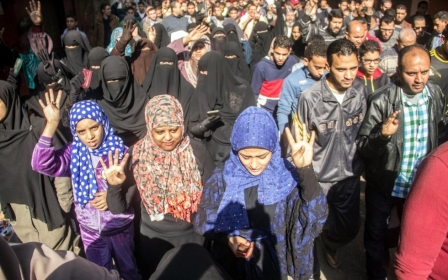Protests in Egypt's Tahrir Square, after murder charges dropped against Mubarak

Protests broke out in Egypt’s iconic Tahrir Square on Saturday evening, after an Egyptian court earlier in the day dropped murder charges against former president Hosni Mubarak.
Around 5,000 people, according to local reporters, gathered close to Tahrir Square – scene of mass protests nearly four years ago that led to Mubarak’s ouster – and chanted against the court ruling.
Protesters, who shouted "Freedom!", also voiced their opposition to current president Abdel-Fattah al-Sisi – the former army chief who led a popularly backed military coup in July 2013 against the freely elected Muslim Brotherhood leader Mohammed Morsi.
After initially allowing protesters to gather, security forces later responded by dispersing the crowds with water cannon, tear gas and birdshot, according to witnesses at the scene.
There were also reports of security forces using live fire against protesters – there were no confirmed injuries at the time of publication.
The Ministry of Interior, the Associated Press reported, said protesters were “peaceful” until 6pm (1600 GMT) when “terrorist” Muslim Brotherhood supporters joined the rally.
The ministry said protesters were “dispersed” after “warnings” had been given.
Authorities detained at least 70 of the protesters, Sky News Arabia reported.
On Saturday morning a court in Cairo dismissed murder charges against Hosni Mubarak over the killing of protesters during the 2011 revolution that removed him from power. It also cleared the former leader of corruption in relation to gas exports made to Israel under his 30-year rule.
Hours after the verdict was handed down Mubarak responded by saying he “did nothing wrong at all”.
Mubarak, his ex-interior minister Habib al-Adly and six former top security officials had all been given life sentences which were overturned on a technicality.
"I did nothing wrong at all," Mubarak said in a telephone interview with the private Sada El Balad broadcaster from the military hospital where he is serving a three-year sentence for a separate corruption case.
"When I heard the first verdict I laughed. I said: 'Ha'!'" Mubarak said of the 2012 sentencing.
He praised his 30-year rule, which was marred by police abuses and corruption, especially the decade before his overthrow.
Apparently referring to economic growth, he said: "The last 10 years showed more results than the 20 years before, including telephones and so on, and then they turned against us."
In Saturday court session, cheers broke out and Mubarak’s two sons stooped down to kiss their father’s forehead when the verdict was read out by judge Mahmoud al-Rashidi.
Rashidi told the court in Cairo, in a session broadcast live on television, that people must not comment on his decision without reading the full 1,430 pages of the verdict.
Rashidi said the total number of protester deaths he considered was 239, well below the total of 846 listed by a government fact-finding panel in 2011. The judge said he had not looked at the reasons behind all those killed in the 18-day uprising in January 2011, but only in the period between 25 and 31 January.
Mubarak, 86, will not be free despite Saturday’s court rulings. He will continue to serve a three year sentence following his conviction in May on corruption charges. He is serving his sentence under house arrest in a Cairo army hospital, due to medical reasons.
Ex-interior minister al-Adly still faces further trials on 12 and 29 December. If he is found not guilty in those cases, then he will be released.
Saturday's verdicts are still subject to appeal.
Observers and human rights activists reacted to the verdict less with surprise that the charges were dropped against Mubarak and that he was acquitted, and more with shock that all of the defendants - including nearly 100 police officers charged with killing protestors during the uprising who were acquitted earlier this year - were cleared.
A well-known Egyptian blogger who writes under the pseudonym The Big Pharoah said he was walking on the street when he heard people on the street shouting to one another, "All were acquitted! All!"
"The shock is basically emanating from the fact that none was sentenced," he told Middle East Eye on Saturday. "This verdict is really shocking because they were all acquitted. Not a single police officer was acquitted. They killed people."
"I don't know if the judge received a call from the army intelligence or not. I really have no idea," he added. "We need to research more on how the justice system works."
Human rights lawyer Mahienour el Massry said it would be challenging from current officials, like Interior Minister Mohammed Ibrahim, to condemn the former leaders because they, too, could be tried in the future.
Ibrahim was the interior minister when when Egyptian army and police moved in to clear a Muslim Brotherhood protest camp on 14 August 2013 near the Rabaa al-Adawiya mosque in Cairo, killing more than 1,000 people, according to Human Rights Watch.
"Mubarak and Habib el-Adly were assassins, but when you think of Mohammed Ibrahim - like what happened in Rabaa - how can he condemn them as well?" she said. "If Habib el-Adly was condemned, we could apply the same to Mohammed Ibrahim"
El Massry, who was released from an Alexandria prison at the end of September after she was sentenced to two years in prison for protesting in 2013, said justice should come before the law, adding that the two were very different concepts.
"Law does not mean justice," she said. "Law is a very double-edged weapon, so when you ask to apply the law, you have to think who will apply it. So they applied the law, but they didn't apply justice."
Additional reporting for this story was provided by Max Siegelbaum and Alessandro Accorsi.
New MEE newsletter: Jerusalem Dispatch
Sign up to get the latest insights and analysis on Israel-Palestine, alongside Turkey Unpacked and other MEE newsletters
Middle East Eye delivers independent and unrivalled coverage and analysis of the Middle East, North Africa and beyond. To learn more about republishing this content and the associated fees, please fill out this form. More about MEE can be found here.




